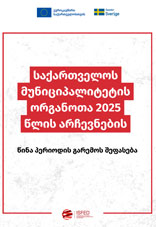
ISFED Declines to Observe Georgia's Upcoming Municipal Elections
By Liza Mchedlidze
Friday, August 22, 2025
The International Society for Fair Elections and Democracy (ISFED) announced it will not conduct a full observation mission for Georgia's municipal elections scheduled for October 4, citing significant concerns over the democratic environment.
In a statement, ISFED explained that its assessment of the pre-election period found that fundamental conditions for free and fair elections were not met. "Respect for fundamental rights, stability of electoral law, and procedural guarantees have largely not been upheld," the organization said.
The watchdog emphasized that its evaluation also considered Georgia's obligations as a European Union candidate country to ensure competitive and transparent elections. Despite opting out of standard observation, ISFED said it would continue to monitor political and electoral developments.
The upcoming elections will allow citizens across 64 municipalities to vote for both municipal councils and mayors. However, ISFED highlighted multiple obstacles that could compromise the legitimacy of the process.
Georgia is entering the elections following a period of political crisis and democratic backsliding. The 2024 parliamentary elections, widely criticized for failing to meet international standards, led to a de facto one-party parliament after an opposition boycott. ISFED noted that the ruling Georgian Dream party has increased pressure on civil society, independent media, and opposition leaders, while protests have been suppressed through restrictive measures.
"Collectively, these developments have severely undermined the fundamental rights essential for democratic elections," ISFED stated.
The organization also criticized recent legislative amendments that it said were rushed and passed without broad consultation. These changes, ISFED argued, strengthened mechanisms to ban parties, restricted election observation, and manipulated the electoral system to favor the ruling party. "The creation of new single-member districts this year further violates international standards, undermining the principle of equal voting power," ISFED said.
Concerns extend to the administration of the elections. The Central Election Commission, now composed mainly of members aligned with the ruling party, has weakened the intended balance of the electoral body. ISFED also highlighted ongoing issues with electronic voting, noting that public trust remains low despite technical adjustments.
The pre-election political climate has intensified challenges for opposition parties. ISFED reported that opposition leaders have faced criminal prosecution, and major parties have boycotted the elections in response to ongoing political repression. Financial disparities between the ruling party and opposition parties have grown, with Georgian Dream controlling the vast majority of state and private funding.
Media freedom has also deteriorated, ISFED said. Independent outlets face financial, legal, and political pressure, while government-aligned media spreads anti-Western propaganda. Journalists have increasingly been targeted with lawsuits and fines, and some media outlets have been forced to close.
Election observation itself faces major restrictions. ISFED noted that the government has not invited an OSCE/ODIHR international mission, and domestic observer organizations face legal and political pressure, limiting their ability to operate independently.
"Breaking with two decades of precedent, the election observation mechanism has become a target of government control, significantly limiting procedural guarantees necessary for democratic elections," ISFED concluded.

